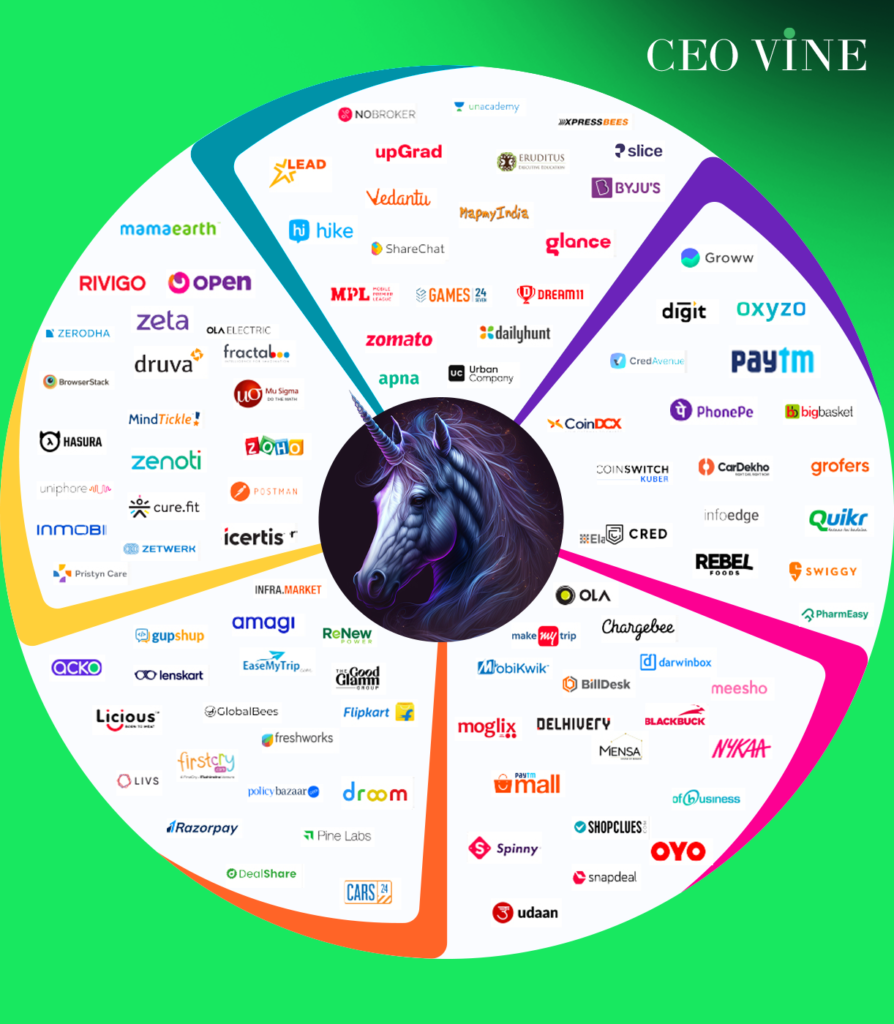In today’s dynamic business landscape, the ultimate goal for many entrepreneurs is to achieve unicorn status — a title reserved for privately held startups valued at over $1 billion. Reaching this milestone is no easy feat, but for startups that do, it signals immense growth potential, innovation, and the ability to make a lasting impact on the global economy.
India’s startup ecosystem, in particular, has become a fertile ground for unicorns. Over the last decade, more than 111 unicorns have emerged, with the market experiencing an exponential 66% year-on-year growth in unicorns since 2017-18.
In 2023, Zepto and InCred were the only startups to join the unicorn club, while in 2022, LEAD became the first unicorn of the year, followed by another 18 companies. This rapid growth raises an important question: what sets these billion-dollar companies apart, and how can emerging startups follow their path to success?

What is a Unicorn Company?
A unicorn company is a privately held startup valued at over $1 billion. The term was coined by venture capitalist Aileen Lee in 2013 to highlight how rare and remarkable such companies were.
Unicorns typically stand out due to their groundbreaking technologies, disruptive business models, and rapid scaling potential. They often operate in sectors like technology, healthcare, fintech, and e-commerce, where innovation plays a critical role in achieving massive growth.
Unicorn status is viewed as the pinnacle of success for startups, offering prestige, heightened interest from investors, and global recognition. In India, the unicorn ecosystem is thriving, driven by a strong IT industry, government incentives, and a large, tech-savvy consumer base.
Achieving unicorn status is difficult but attainable if startups can implement the right strategies from inception. Here are 10 ways to guide your startup towards becoming a unicorn.
1. Ignite Your Entrepreneurial Spirit
The first step toward building a unicorn startup is to unleash your inner entrepreneur. It’s more than just having an idea; it’s about being passionate, resilient, and willing to take calculated risks.
The startup journey is filled with uncertainties, and only those who can think creatively and bounce back from setbacks will succeed. Remember, persistence is key in overcoming the challenges that come your way.
2. Start with a Unique Idea
The foundation of every unicorn company is a groundbreaking idea. Your concept must be unique, innovative, and have the potential to disrupt the market.
Spend time brainstorming and researching to ensure your idea stands out. Think of ways your product or service can solve a real-world problem in a better, faster, or more affordable way than what’s already available.
3. Do Your Research
Research is the backbone of any successful startup. Validate your idea through market research, understand your competitors, and identify gaps in the market.
A well-researched business model can save you from costly mistakes down the road. This phase also helps you shape a solid business plan that will attract investors and provide a clear roadmap for your startup’s growth.
4. Develop a Solid Business Plan
A strong business plan is essential, especially when seeking investment. Investors want to see a well-thought-out strategy that includes everything from product development to market penetration.
Your plan should cover how you intend to grow, what your revenue streams will look like, and how you plan to handle competition. This document is your pitch to potential backers, so make it compelling.
5. Secure the Right Funding
No unicorn is built without the right financial backing. Understanding the funding landscape is critical. You might start with seed funding or bootstrap in the early stages, but as your business grows, venture capital (VC) or angel investors can provide the capital you need to scale.
Whether you opt for VCs, angel investors, or crowdfunding, learn how to pitch your idea effectively. Highlight your growth potential, the market opportunity, and your unique selling proposition to secure the funds that will propel your startup forward.
6. Build an Outstanding Team
A successful unicorn isn’t built by one person alone. The team you assemble is just as important as the idea you’re working on. Hire people whose skills complement yours and who believe in your vision. A mix of technical talent, business acumen, and creative problem solvers will give your startup the edge it needs to grow.
More importantly, foster a culture of collaboration, innovation, and passion within your team. As the saying goes, teamwork makes the dream work.
7. Scale for Success
Once you’ve built a solid foundation, the next step is scaling your startup. Scaling involves expanding your product or service offering, exploring new markets, and increasing your customer base. This is where many startups stumble, as scaling too fast can be risky. Focus on sustainable growth, build efficient systems, and ensure you have the right resources in place to handle increased demand.
8. Learn from Failure and Iterate
Failure is inevitable on the road to success. Rather than fearing it, embrace failure as a learning opportunity. Many unicorn founders have pivoted their businesses several times before finding the right product-market fit. Don’t be afraid to change course based on feedback and lessons learned. Iteration and adaptability are crucial in ensuring your startup stays relevant and continues to grow.
9. Leverage Market Trends
A unicorn company stays ahead by embracing change and leveraging market trends. Whether it’s new technologies, changing consumer behavior, or regulatory shifts, successful startups adapt to external factors.
Keep an eye on industry trends, be open to pivoting your strategy, and always look for new opportunities to innovate. Continuous adaptation keeps your startup relevant and poised for long-term success.
10. Maintain a Long-Term Vision
Reaching unicorn status doesn’t happen overnight. While it’s essential to focus on immediate goals, keep your long-term vision at the forefront. Successful unicorns balance short-term growth with a bigger picture. Always ask yourself how your current efforts contribute to your overall mission and long-term objectives. Stay committed to your vision, and it will guide your startup through every phase of growth.
India has become a hub for unicorns in recent years, with sectors like fintech, e-commerce, and edtech leading the charge. The country’s IT industry, along with supportive government policies and a large consumer base, has created fertile ground for startups to flourish.
In 2024, 6 companies—KRUTRIM, ATHER, Perfios, Rapido, RateGain, and MoneyView—reached unicorn status, further proving that innovation, resilience, and strategic planning can turn dreams into billion-dollar realities.
Many of India’s unicorns have emerged from industries that benefit from digital transformation, including fintech companies like Paytm, Udaan, and Razorpay, which have revolutionized how transactions are made, goods are traded, and financial services are accessed.
Reaching unicorn status is a challenging but achievable goal for startups that are committed to innovation, scalability, and resilience. By following the right strategies, securing the right funding, and building a strong team, your startup could join the growing list of billion-dollar companies.
The Indian startup ecosystem, with its rapid growth and vibrant entrepreneurial spirit, is a testament to what can be achieved when startups dare to think big and aim high.
FAQs
- What is a unicorn company?
A unicorn company is a privately held startup with a valuation exceeding $1 billion. - How do startups achieve unicorn status?
Startups reach unicorn status through a combination of innovation, rapid growth, and securing external funding. - What sectors do most unicorns operate in?
The majority of unicorns operate in industries such as technology, fintech, healthcare, and e-commerce. - What is a soonicorn?
A soonicorn is a startup that is close to achieving unicorn status, typically valued between $500 million and $1 billion. - How many unicorns are there in India?
As of the latest reports, India has more than 111 unicorns. - What’s the largest unicorn in India?
Byju’s, an EdTech company, was India’s largest unicorn in terms of market valuation as of January 2023. BYJU’S was the first Indian company to appear in global rankings and was valued at $22 billion at the end of 2022. - Can a unicorn lose its status?
Yes, if a company’s valuation falls below $1 billion, it can lose its unicorn status. - How can a startup secure funding?
Startups can secure funding through venture capitalists, angel investors, crowdfunding, or strategic partnerships. - What are the main challenges unicorns face?
Unicorns often face challenges related to scaling, managing growth, and sustaining profitability. - How long does it take to become a unicorn? There is no set timeline for becoming a unicorn, but it typically takes several years of sustained growth and innovation.







